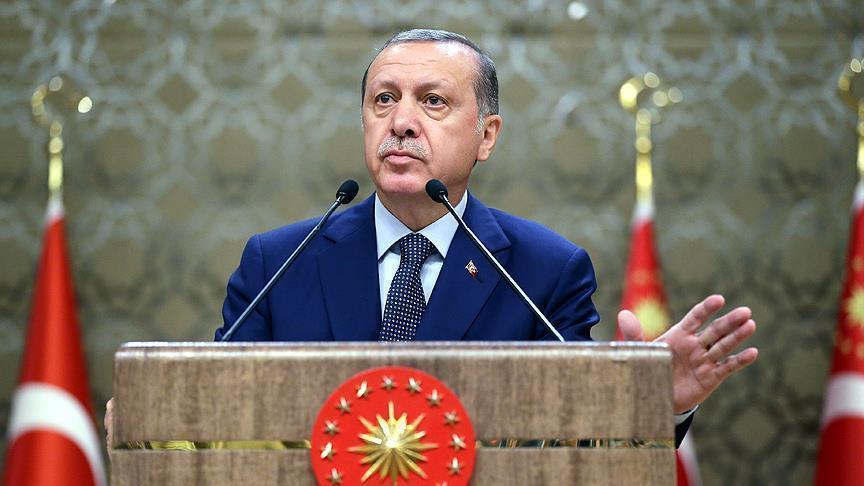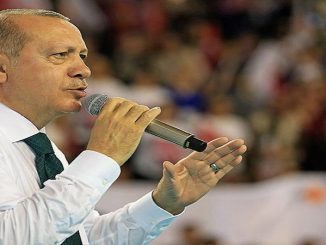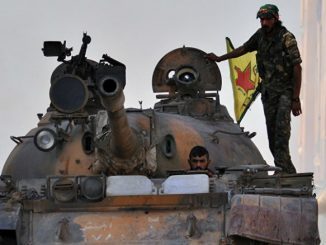
Turkey’s military operation in northern Syria will target ISIS in al-Bab city and its stronghold in Raqqa, also the town of Manbij held by Kurdish militias, despite a warning from forces allied to Syrian President Bashar al-Assad and a helicopter attack on the rebels it backs.
Turkish president Tayyip Erdogan said Turkey’s military operations in Syria aimed to secure al-Bab and the town of Manbij, which a group of Kurdish militias seized from ISIS in August, but were not intended to stretch to Aleppo.
He said also that he plans to take part in the coming military operation against ISIS in Raqqa.
In a speech in Ankara broadcast live, Erdogan said he had informed U.S. President Barack Obama about his plans for the operation in a telephone call on Wednesday. Before Manbij and Raqqa, the operation will target the town of al-Bab, he said.
“Let’s make a joint fight against terrorist organizations. But Aleppo belongs to the people of Aleppo … making calculations over Aleppo would not be right,” he said in a speech in Ankara.
“Some insist on trying to keep Turkey and the FSA away from al-Bab. We are determined to cleanse Manbij from the PYD as soon as possible. Either they abandon the area as soon as possible, or we will do what is necessary,” Erdogan said on Wednesday.
Erdogan signaled Turkey could target the Afrin region of northwest Syria, which is controlled by Kurdish YPG forces and lies just west of the “Euphrates Shield” area of operations.
“In order to defeat threats directed at our nation from Kilis to Kirikhan, we are also putting that area on our agenda of cleansing from terror,” he said, referring to two Turkish towns across the border from Afrin.
Turkey-backed rebels attacked
As the Turkey-backed rebels push south towards al-Bab, an Islamic State-held town 35 km (22 miles) northeast of Aleppo, they face confrontation with both Kurdish and pro-Assad forces, whose frontlines lie close by.
The field commander of the forces allied to the Syrian leader – which include the Lebanese group Hezbollah, Iraqi militias and the Iranian Revolutionary Guards – warned Turkey any advance towards their positions north and east of Aleppo would be met “decisively and with force”
The Turkish military said the threat was real and a helicopter “assessed to belong to regime forces” bombed the rebels it backs in a village near Akhtarin, a town 5 km (3 miles) southeast of Dabiq, late on Tuesday. Dabiq is a former Islamic State stronghold that the rebels seized from the jihadists this month.
It was the first time a direct clash between Syrian forces and the Turkey-backed rebels has been announced. Two rebels were killed and five wounded, the Turkish army said.
“This kind of attack will not stop our fight against Daesh (Islamic State),” Turkish Foreign Minister Mevlut Cavusoglu told a news conference in the capital Ankara.
“This operation will continue until al-Bab. The operation needs to continue, and it will,” he said.
The Syrian military could not immediately be reached for comment, but it said last week that the presence of Turkish troops on Syrian soil was a “dangerous escalation and flagrant breach of Syria’s sovereignty”. It warned it would bring down any Turkish warplanes entering Syrian airspace.
Conflicting goals
Turkey’s military operation in Syria named Euphrates shield was launched two months ago to drive Islamic State militants from its border and prevent Kurdish fighters from gaining ground and strengthen their positions, has changed te balance of power in northern Syria and added more tension to the already complicated area.
Syrian rebels were able to retrieve Jarablus town from ISIS and opened a new front to the west at al-Rai village, putting more pressure on ISIS militants from the both sides and securing the Syrian-Turkish border from the militants’ presence.
Syrian rebels retrieve Dabiq town also from ISIS, paving the way to attack al-Bab city near Aleppo.
The rebels have since extended those gains and now control an area of roughly 1,270 square km (490 square miles) in northern Syria.
The Turkish military also shelled Kurdish militias’ positions northern Syria while the rebel forces clashed with them in many incidents.
Turkey sees the PYD and their armed wing YPG as an extension of Kurdish PKK militants who have waged a three-decade insurgency in southeastern Turkey.
Turkey fears the YPG will try to connect three de facto autonomous Kurdish cantons that have emerged during the five-year war to create a Kurdish-run enclave in northern Syria, stoking the separatist ambitions of Kurds on its own soil.
Its intervention therefore also aimed to prevent Kurdish forces from gaining more ground.



